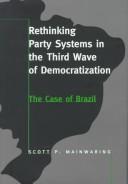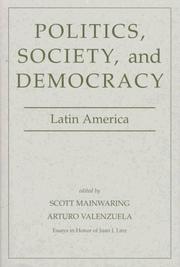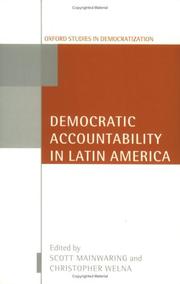| Listing 1 - 10 of 24 | << page >> |
Sort by
|

ISBN: 0804730571 0804730598 Year: 1999 Publisher: Stanford, Calif. : Stanford University Press,
Abstract | Keywords | Export | Availability | Bookmark
 Loading...
Loading...Choose an application
- Reference Manager
- EndNote
- RefWorks (Direct export to RefWorks)
Political parties --- Political culture --- Democracy --- Elite (Social sciences) --- Partis politiques --- Culture politique --- Démocratie --- Elite (Sciences sociales) --- Brazil --- Brésil --- Politics and government --- Politique et gouvernement --- Démocratie --- Brésil

ISBN: 0804713200 9780804713207 Year: 1986 Publisher: Stanford (Calif.): Stanford university press
Abstract | Keywords | Export | Availability | Bookmark
 Loading...
Loading...Choose an application
- Reference Manager
- EndNote
- RefWorks (Direct export to RefWorks)
Church and state --- History --- Catholic Church --- Brazil --- Church history --- Politics and government --- 241.62*3 --- 282 <81> --- -#SBIB:98G --- Christianity and state --- Separation of church and state --- State and church --- State, The --- Theologische ethiek: houding tegenover de staat --- Katholieke Kerk. Rooms-katholieken--Brazilië --- -Geschiedenis van Latijns-Amerika --- -Church of Rome --- Roman Catholic Church --- Katholische Kirche --- Katolyt︠s︡ʹka t︠s︡erkva --- Römisch-Katholische Kirche --- Römische Kirche --- Ecclesia Catholica --- Eglise catholique --- Eglise catholique-romaine --- Katolicheskai︠a︡ t︠s︡erkovʹ --- Chiesa cattolica --- Iglesia Católica --- Kościół Katolicki --- Katolicki Kościół --- Kościół Rzymskokatolicki --- Nihon Katorikku Kyōkai --- Katholikē Ekklēsia --- Gereja Katolik --- Kenesiyah ha-Ḳatolit --- Kanisa Katoliki --- כנסיה הקתולית --- כנסייה הקתולית --- 가톨릭교 --- 천주교 --- -Brazil --- Church history. --- -241.62*3 --- -History --- 241.62*3 Theologische ethiek: houding tegenover de staat --- -Church and state --- Brazylia --- República Federativa do Brasil --- Brasil --- République fédérative du Brésil --- Brésil --- Brasilien --- Pa-hsi --- Federative Republic of Brazil --- Brasile --- Brazilië --- Brazilia --- Бразил --- Федерациэм Республикэ Бразил --- Federat︠s︡iėm Respublikė Brazil --- Brasilië --- Federale Republiek van Brasilië --- البرازيل --- al-Barāzīl --- برازيل --- Barāzīl --- Rèpublica fèdèrativa du Brèsil --- Pindorama --- Tetã Pindorama --- Wrasil --- Tantasqa Republika Wrasil --- Braziliya --- Braziliya Federativ Respublikası --- Pa-se --- Pa-se Liân-pang Kiōng-hô-kok --- Бразилия --- Brazilii︠a︡ --- Бразилия Федератив Республикаhы --- Brazilii︠a︡ Federativ Respublikaḣy --- Бразілія --- Федэратыўная Рэспубліка Бразілія --- Fedėratyŭnai︠a︡ Rėspublika Brazilii︠a︡ --- Федеративна република Бразилия --- Federativna republika Brazilii︠a︡ --- Federativna republika Brazil --- Republik Kevreel Brazil --- República Federal del Brasil --- Бразили --- Brazili --- Бразили Федеративлă Республики --- Brazili Federativlă Respubliki --- Brazilská federativní republika --- Pederatibong Republika sa Brasil --- Republica Federativa del Brazil --- Republica Federale di u Brasile --- Gweriniaeth Ffederal Brasil --- Brasilia --- ブラジル --- Burajiru --- #SBIB:98G --- Geschiedenis van Latijns-Amerika --- Church of Rome --- Church and state - Brazil - History - 20th century --- Brazil - Church history --- Brazil - Politics and government - 20th century
Book
ISBN: 1316814610 1316798550 1316811883 1107175526 1316627527 9781316627525 9781107175525 9781316798553 Year: 2018 Publisher: Cambridge : Cambridge University Press,
Abstract | Keywords | Export | Availability | Bookmark
 Loading...
Loading...Choose an application
- Reference Manager
- EndNote
- RefWorks (Direct export to RefWorks)
Based on contributions from leading scholars, this study generates a wealth of new empirical information about Latin American party systems. It also contributes richly to major theoretical and comparative debates about the effects of party systems on democratic politics, and about why some party systems are much more stable and predictable than others. Party Systems in Latin America builds on, challenges, and updates Mainwaring and Timothy Scully's seminal Building Democratic Institutions: Party Systems in Latin America (1995), which re-oriented the study of democratic party systems in the developing world. It is essential reading for scholars and students of comparative party systems, democracy, and Latin American politics. It shows that a stable and predictable party system facilitates important democratic processes and outcomes, but that building and maintaining such a party system has been the exception rather than the norm in contemporary Latin America.
Political parties --- Political culture --- Democracy --- Latin America --- Asociación Latinoamericana de Libre Comercio countries --- Neotropical region --- Neotropics --- New World tropics --- Spanish America --- Politics and government --- Political parties - Latin America --- Political culture - Latin America --- Democracy - Latin America --- Latin America - Politics and government - 21st century

ISBN: 0813385482 0813337267 Year: 1998 Volume: 3 Publisher: Boulder, Colo. Westview
Abstract | Keywords | Export | Availability | Bookmark
 Loading...
Loading...Choose an application
- Reference Manager
- EndNote
- RefWorks (Direct export to RefWorks)
Government --- Social stratification --- Political systems --- Latin America --- Authoritarianism --- Democracy --- Executive power --- Autoritarisme --- Démocratie --- Pouvoir exécutif --- Amérique latine --- Politics and government. --- Politique et gouvernement --- Démocratie --- Pouvoir exécutif --- Amérique latine --- Politics and government
Book
ISBN: 0268015732 9780268015732 Year: 1989 Publisher: Notre Dame University of Notre Dame press
Abstract | Keywords | Export | Availability | Bookmark
 Loading...
Loading...Choose an application
- Reference Manager
- EndNote
- RefWorks (Direct export to RefWorks)
Catholic Church --- History --- Latin America --- Church history --- 282 <8=6> --- 241.1*31 --- Katholieke Kerk. Rooms-katholieken--Latijns Amerika --- Politieke theologie. Bevrijdingstheologie. Ethiek van de revolutie --- -Church of Rome --- Roman Catholic Church --- Katholische Kirche --- Katolyt︠s︡ʹka t︠s︡erkva --- Römisch-Katholische Kirche --- Römische Kirche --- Ecclesia Catholica --- Eglise catholique --- Eglise catholique-romaine --- Katolicheskai︠a︡ t︠s︡erkovʹ --- Chiesa cattolica --- Iglesia Católica --- Kościół Katolicki --- Katolicki Kościół --- Kościół Rzymskokatolicki --- Nihon Katorikku Kyōkai --- Katholikē Ekklēsia --- Gereja Katolik --- Kenesiyah ha-Ḳatolit --- Kanisa Katoliki --- כנסיה הקתולית --- כנסייה הקתולית --- 가톨릭교 --- 천주교 --- -Latin America --- Asociación Latinoamericana de Libre Comercio countries --- Neotropical region --- Neotropics --- New World tropics --- Spanish America --- -282 <8=6> --- -History --- 241.1*31 Politieke theologie. Bevrijdingstheologie. Ethiek van de revolutie --- -Catholic Church --- -241.1*31 --- Church of Rome --- Latin America - Church history - 20th century

ISBN: 0199256373 0199256381 1281925063 9786611925062 0191531340 Year: 2003 Publisher: Oxford ; New York : Oxford University Press,
Abstract | Keywords | Export | Availability | Bookmark
 Loading...
Loading...Choose an application
- Reference Manager
- EndNote
- RefWorks (Direct export to RefWorks)
This volume on democratic accountability addresses one of the burning issues on the agenda of policy makers and citizens in contemporary Latin America: how democratic leaders in Latin America can improve accountability while simultaneously promoting governmental effectiveness.
Democracy --- Government liability --- Démocratie --- Etat --- Responsabilité --- Latin America --- Amérique latine --- Politics and government --- Politique et gouvernement --- Government immunity --- Government responsibility --- Liability, Government --- Liability, Public --- Liability of the state --- Public liability --- Sovereign immunity --- State liability --- State responsibility --- Tort liability of the government --- Tort liability of the state --- Administrative law --- Administrative responsibility --- Constitutional law --- Liability (Law) --- Misconduct in office --- Public law --- Torts --- Act of state --- Constitutional torts --- State action (Civil rights) --- Law and legislation
Book
ISBN: 0804772967 9780804772969 9780804760843 9780804760850 0804760845 9780804760843 0804760853 Year: 2010 Publisher: Stanford, Calif. Stanford University Press
Abstract | Keywords | Export | Availability | Bookmark
 Loading...
Loading...Choose an application
- Reference Manager
- EndNote
- RefWorks (Direct export to RefWorks)
Producing more effective governance is the greatest challenge that faces most Latin American democracies today—a challenge that involves not only strengthening democratic institutions but also increasing governmental effectiveness. Focusing on the post-1990 period, this volume addresses why some policies and some countries have been more successful than others in meeting this dual challenge. Two features of the volume stand out. First, whereas some analysts tend to generalize for Latin America as a whole, this group of authors underscores the striking differences of achievement among countries in the region and illustrates the importance of understanding these differences. The second feature is the range of expertise within the volume. In addition to the volume editors, the contributors are Alan Angell, Daniel Brinks, Fernando Henrique Cardoso, José de Gregorio, Alejandro Foxley, Evelyne Huber, José Miguel Insulza, Juliana Martínez Franzoni, Patricio Navia, Francisco Rodriguez, Mitchell Seligson, John Stephens, Jorge Vargas Cullell, and Ignacio Walker.
Democracy --- Latin America --- Politics and government --- Economic conditions --- Démocratie --- Amérique latine --- Politique et gouvernement --- Conditions économiques
Book
ISBN: 1108560563 1108556515 1108625061 1108426670 1108445411 Year: 2018 Publisher: Cambridge : Cambridge University Press,
Abstract | Keywords | Export | Availability | Bookmark
 Loading...
Loading...Choose an application
- Reference Manager
- EndNote
- RefWorks (Direct export to RefWorks)
Life after Dictatorship launches a new research agenda on authoritarian successor parties worldwide. Authoritarian successor parties are parties that emerge from authoritarian regimes, but that operate after a transition to democracy. They are one of the most common but overlooked features of the global democratic landscape. They are major actors in Africa, Asia, Europe, and Latin America, and they have been voted back into office in over one-half of all third-wave democracies. This book presents a new set of terms, definitions, and research questions designed to travel across regions, and presents new data on these parties' prevalence and frequent return to power. With chapters from leading Africanists, Asianists, Europeanists, and Latin Americanists, it asks: why are authoritarian successor parties so common? Why are some more successful than others? And in what ways can they harm - or help - democracy?
Dominant-party systems --- Authoritarianism --- Political science --- Authority --- One-party dominant systems --- Political parties
Book
Year: 1987 Publisher: Notre Dame University of Notrte Dame. The Helen Kellogg Institute for international studies
Abstract | Keywords | Export | Availability | Bookmark
 Loading...
Loading...Choose an application
- Reference Manager
- EndNote
- RefWorks (Direct export to RefWorks)
Book
ISBN: 9781108560566 9781108426671 9781108445412 Year: 2018 Publisher: Cambridge Cambridge University Press
Abstract | Keywords | Export | Availability | Bookmark
 Loading...
Loading...Choose an application
- Reference Manager
- EndNote
- RefWorks (Direct export to RefWorks)
| Listing 1 - 10 of 24 | << page >> |
Sort by
|

 Search
Search Feedback
Feedback About UniCat
About UniCat  Help
Help News
News